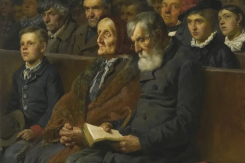Sometime in April; Hotel Rwanda
Both these films deal with the 1994 genocide in Rwanda and are similar in content, often overlapping in events of 1994 and the way they are portrayed visually. In fact, sequences from each film could be inserted into the other. Both films are complementary, the hero of Sometimes in April eventually finds refuge in the Hotel Mille Collines in Kigali which is being managed by the hero of Hotel Rwanda.
Hotel Rwanda is a biographical portrait of Paul Rusesabugina, the Hutu manager of the hotel who has a Tutsi wife. Sometimes in April also has a Hutu lead, a military man, married to a Tutsi wife. Sometimes in April is broader in scope since it also features the political discussions in Washington DC as well as some of its action taking place in 2004.
Sometime in April
Writer-director, Raoul Peck, was asked by Home Box Office, on the strength of his films on Lumumba, to make a film about the 1994 Rwandan genocide when militant Hutus massacred almost a million Tutsis and 30% of the third tribe, the Batwa (Twa). There have been documentary models of films portraying 20th century genocides (Shoa, S 21), fictions (Sophia's Choice), docudramas (Schindler's List) and biographies (Hotel Rwanda, The Killing Fields). Peck has opted to tell a family story set within the broad historical, political and social context of this small country of central Africa. The result is a profoundly moving experience, putting a human face on the suffering brought about by fanatical and brutal atrocities.
The screenplay veers between 2004, the tenth anniversary of the genocide, opening with a teacher and students watching a tape with a 1994 speech by President Clinton. The Hutu teacher (Idris Elba) remembers his military career, his Tutsi wife (Caroline Karemera), his children, his radio personality brother who had embraced and fomented the Hutu ascendancy. We see the horrible killings through the teacher's memories although he still does not know the actual fate of his family. But the audience does.
Intercut with the barbarity of the killings are sequences of US and UN action and inaction, especially in the US State Department where a sympathetic bureaucrat, Prudence Bushnell (Debra Winger) tries to raise US consciousness beyond the rescue of American citizens and declaring to the media which side are the goodies'. Also intercut are 2004 sequences of trials being held in Tanzania where the teacher's brother has now pleaded guilty. The challenge is how to acknowledge the truth, whether forgiveness and reconciliation are possible, and how to build an inclusive Rwandan future finishing ith an image of teacher and students enjoying Charlie Chaplin tweaking the pomposity of tyrants in The Great Dictator.
The cast performs with both humanity and dignity. The visual portrayal of the killings is graphic but restrained enough for most audiences to be able to watch the film which they should. They will grieve at such prejudice and inhuman cruelty.
Hotel Rwanda
It is probably a blessing for the commercial success of Hotel Rwanda that Don Cheadle and Sophie Okeinado were nominated for acting Oscars, otherwise the film might have received very limited release. (This happened with director Terry George's moving film about IRA prisoners in the late 1970s, Some Mother's Son; it was considered not commercial enough to warrant a promotion budget.) Along with Raoul Peck's quite similar, Sometimes in April, it offers an opportunity for a world audience to learn something about the 1994 genocide in Rwanda and learn lessons about compassion and the need for political will for help and intervention.
Shot principally in Rwanda, the film has an authentic look and feel, some of it with documentary vividness. However, it is the story of one man, Paul Rusesabugina, the dapper manager of the Mille Collines Hotel in Kigali, who prided himself on running a four star hotel for prominent guests, offering the best in style and service. Groomed by the Belgian company, Sabena, who owned the hotel, he has been able to ingratiate himself with military leaders and is well-known to the United Nations forces. He is a Hutu, but is married to a Tutsi. When the Hutu uprising begins, he is desperate to protect his wife and children but has to face crises in Hutu staff malice, the evacuation of foreign nationals (but no locals), the impotence of the United Nations, the brutal physical violence of the massacres. He takes in refugees, especially orphans from the Red Cross, and manages to save many of them.
This is a particular focus (Sometimes in April ranges more broadly, especially with US policy and the aftermath in 2004), the story of an ordinary man who is asked to be more heroic than he ever imagined. His story is placed firmly in context so that we understand something of the uprising, the Hutu hatred of Tutsis ('rebel cockroaches'), the urgings of hate radio, the slowness of the world to respond.
Don Cheadle (who can do comedy as well as con-man gangsters so well) is utterly persuasive as Paul. The audience experiences the action through complete sympathy with him. He seems accent-perfect (despite his horribly phoney Cockney in Oceans 11 and Oceans 12). Sophie Okeinedo is his wife. A strong African cast gives authenticity and Nick Nolte (as UN leader) , Joaquin Phoenix (as a TV reporter) and Jean Reno (as the president of Sabena) give the film some international appeal.
It is harrowing to remember that such genocide and subsequent refugee movement could happen in the 1990s.
LONDON - 21 February 2005 - 929 words


















